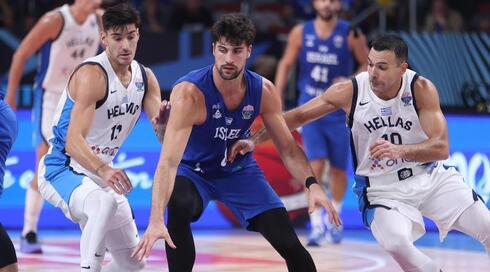Giannis Antetokounmpo is an extraordinary phenomenon in basketball, both in the NBA and in this championship. Other players in EuroBasket are difficult to guard, including Luka Dončić, Lauri Markkanen, Nikola Jokić, Dennis Schröder and others, but no one in the world possesses Giannis’ combination of size, speed and strength. Even in the NBA, stopping him on a drive requires coordinated effort from multiple athletic players with large frames and even then he often succeeds. This ability helped Milwaukee, a relatively limited team, win a championship in 2021.
Israel does not have players of comparable size. The challenge was not tactical, nor a question of assigning one defender or another, or deciding when help should arrive. Many times during the game, Giannis received the ball with two defenders in front of him, bypassed both and reached the basket. In the second half, Israel managed to provide coordinated help from two additional players beyond his primary defender and prevented him from taking easy shots, a significant accomplishment not easily achieved.
Beyond Antetokounmpo, Israel limited nearly all Greek players below their usual performance level, demonstrating excellent preparation. Offensively, Israel also executed its game plan effectively. When Giannis guards the paint, scoring in the half-court is extremely difficult. He quickly recovers after screens and returns to his man, making pick-and-roll plays largely ineffective. Israel capitalized on its players’ superior speed, taking multiple transition three-pointers and scoring efficiently against strong defense. This performance came despite Danny Avdija’s worst offensive game of the tournament, showing that the team is not entirely dependent on one player.
Confidence for the future
The championship offered several lessons. Avdija confirmed he is one of Europe’s top stars. Tomer Ginat demonstrated throughout the tournament that he can compete at the highest level. Against Dinos Mitoglou, a skilled EuroLeague forward with experience at Panathinaikos, Ginat performed well on defense and offense despite the height disadvantage.
Yam Madar also showed promise. He played confidently under heavy defensive pressure, made multiple steals, avoided turnovers and made good decisions. Although Madar is recovering from injury and his full potential is uncertain, if he maintains this level of play, he is well suited for EuroLeague competition. He will need to adjust his individual defensive style, as he sometimes stays too close to opponents, allowing them to get past him.
Roman Sorkin had a strong tournament, showing consistent offensive growth. His presence on and off the court was positive, though he could increase his defensive aggression in position battles.
On naturalized players, Israel faced challenges. Kadeem Carrington performed well in previous seasons but underperformed this championship and did not meet expectations seen in other naturalized players on international teams. Jordan Loyd was mentioned as a potential comparison for immediate impact. The naturalization process for players has been slow and needs to be expedited so players can contribute at their peak.
Israel’s main gap was at the shooting guard position. Yuval Zussman’s limited contribution highlighted the absence of a player like Emmanuel Sharp, a tough defender with a reliable three-point shot who could open defenses and create space in the paint for Israel’s strong big men. Sharp would be a valuable addition for future tournaments.
Coach Ariel Beit Halachmi reached his peak in the game against Greece. Against France, Beit Halachmi relied too heavily on the starting lineup and did not defend Luka Dončić optimally. Against Greece, he made bold adjustments, including starting Itay Segev to guard Giannis Antetokounmpo and Guy Peltin to cover Tyler Dorsey and implementing a different offensive approach. Some strategies were more successful than others, but they reflected a willingness to depart from routine and focus on the substance rather than the status of individual players.
A sense of missed opportunity
In terms of Israel’s placement, the team performed as expected. On paper, Israel is stronger than Belgium and Iceland and weaker than other teams. Yet Israel’s performance on the court left a sense of missed opportunity, as the team exceeded theoretical expectations. The victory over France was a highlight, demonstrating maturity and toughness as the French team struggled under pressure.
The loss to Poland is often seen as a failure, but Poland proved to be a very difficult opponent. With Mateusz Ponitka, Jordan Loyd and Michał Sokołowski in the backcourt, complemented by two physical centers, Poland’s advancement to the quarterfinals was justified. Israel came close to victory and its narrow loss, likely due to suboptimal minute management, underscores its strength as a team.
The disappointing game against Slovenia highlighted defensive challenges against Dončić. Peltin could have played more minutes, Rafi Menco could have contributed due to his similar size and Avdija could have participated more. While it was important to protect Avdija from fouls, Dončić is an elite NBA player, and aggressive man-to-man defense might have been more effective than extensive help defense. Just as Panagiotis Kalaitzakis challenged Avdija one-on-one, Israel had sufficient candidates to attempt the same strategy against Dončić.
Had Israel faced Italy in the round of 16, it would have been a matchup at Israel’s level. The team’s overall performance, coupled with minor refinements, provides optimism for higher placements in future championships.

